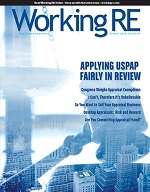 |
“One of the best courses that I have had in 17 years!” -Amy H.
|
Big Data, Big Risk?
By David Brauner, Publisher
In the interview we did with Fannie Mae last issue, Fannie Mae & Your Future, Fannie says that they have determined that big data, when combined with new and powerful algorithms, are “good enough” for certain types of transactions—and are cheaper and faster to boot, which is seemingly what everyone demands these days.
In a story we ran on the recent changes to the bachelor’s degree and experience requirements, the AQB wrote: “The importance of qualified appraisers performing solid valuations on residential and non-residential real property cannot be understated.” We hear this a lot from appraisal regulators and appraisers but I’m beginning to wonder if anyone else believes it. Fannie says that “only” about five percent of purchases (and up to 25 percent of limited cash-out refis) qualify for “property inspection waivers” (PIWs), which insulate lenders against loss if they skip the appraisal. This effectively gives lenders a “free pass” to take a risk (on the taxpayer dime). Fannie is quick to point out that only a small percentage of transactions will qualify, but it’s hard to believe that the program will not expand or that doing so is not one of Fannie’s top priorities.
There are two TED Talks/TED Radio Hour (Google it) on “Big Data” that you may find interesting. One, by Melissa Wang, is titled “The Human Insights Missing from Big Data.” Wang is a technology ethnographer who helps corporations grow by discovering the unknown about their customers. She uses data to make her point and to make her living. The teaser says: “Why do so many companies make bad decisions, even with access to unprecedented amounts of data? Wang demystifies big data and identifies its pitfalls, suggesting that we focus instead on ‘thick data’—precious, unquantifiable insights from actual people, to make the right business decisions and thrive in the unknown.” Wall Street analysts have known about this for years. The other talk, by Susan Etlinger, is entitled: “How Do We Approach Big Data with a Critical Eye?” Etlinger is an industry analyst whose expertise is data and analytics. She cites examples of how things that are factually correct often don’t tell the whole story; how one metric can be overvalued, while another undervalued and how the missing ingredient is human nuance. Ring a bell?
(story continues below)
(story continues)
She concludes: data doesn’t create meaning, people do. Indeed. In the march toward automation and the rush to save time and money, maybe the value of the human touch—of critical thinking—is being dismissed. Etlinger says that we all need to ask: does the data really show us what we think it does or does it just make us feel smarter or more comfortable? Interesting question.
New Course: The OREP Education Network is now offering a new online continuing education course, How to Raise Appraisal Quality and Minimize Risk (7 Hrs), designed to help appraisers stay out of trouble with their state boards and avoid lawsuits. Learn to build a stronger workfile and a bulletproof appraisal report. Visit OREPEducation.org today!
“I have recently completed the best appraisal class of my 30 year career (How to Support and Prove Your Adjustments through OREP.) ” -Susan D.
Continuing Education: How To Support and Prove Your Adjustments
Presented by: Richard Hagar, SRA (7 Hrs. Online CE)
“One of the best courses that I have had in 17 years!” -Amy H.
Must-know business practices for all appraisers working today. Ensure proper support for your adjustments. Making defensible adjustments is the first step in becoming a “Tier One” appraiser, who earns more, enjoys the best assignments and suffers fewer snags and callbacks. Up your game, avoid time-consuming callbacks and earn approved CE today!
Sign Up Now! $119 (7 Hrs)
OREP Insured’s Price: $99
About the Author
David Brauner is Senior Broker of OREP and Publisher of Working RE Magazine. David has been helping appraisers with insurance for over 20 years. David Brauner Insurance Services, Calif. Insurance Lic: 0C89873. OREP- Organization of Real Estate Professionals Insurance Services, LLC. Calif. Lic. #0K99465; dbrauner@orep.org (888) 347-5273 toll free. Visit OREP today for a same day quote on appraiser insurance.
Send your story submission/idea to the Editor: isaac@orep.org




by michael Ford
‘Big Data’ is just a tool. Like any tool it can be misused. It is especially subject to being misrepresented by what can only be described as ‘selective morality’ special interest advocates in the software-SALES industry.
Hammers have many uses. BIG hammers can do even more than little hammers in selected circumstances. The software hucksters have been telling us that sledge hammers are ‘good enough’ when it comes to putting tacks in thin walls.
Damn the consequences.
-by Arty
Human insights is what it is all about. No purchase is more subjective
-(appetite driven) than home buying. All these algorithms do is make software
engineers money, not appraisers. But, where can they be found after the next crisis?
by Hans G. Schaetzke II
Peering at data does not mean that the data recognizes the question you are asking. It can make a person think the information is pertinent, that it is relevant but, the weaknesses in projecting our question on mindless data is that the data didn’t hear the question. If that doesn’t make sense its okay. Go ahead, keep talking to deaf and dumb numbers – you will soon know everything you need to know. Either you will entirely redefine what is perceived as value influencing and thus ruin the most important free market in history or I’ll be coming back and charging you lawyer money for a real appraisal, in the near future. There is a reason why Zillow is Free.
-